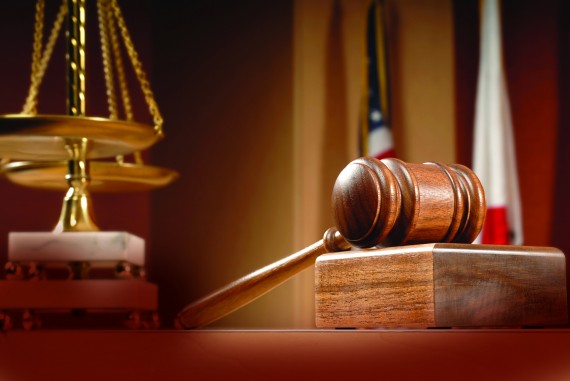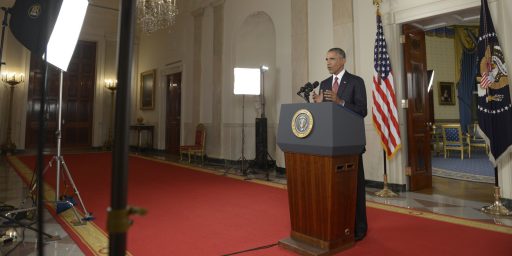Families Of Pulse Nightclub Shooting Victims Sue Facebook, Twitter, And Google
Survivors and family members of the Pulse Nightclub attack have filed what amounts to a frivolous lawsuit.
Families of the victims of this year’s shooting at an Orlando nightclub have filed a lawsuit against Twitter, Facebook, and other social media companies alleging that they have provided a medium for terror groups to communicate with each other and with potential supporters and that therefore they should be held liable for terrorist attacks:
In June, a gunman killed 49 people and wounded 53 others in a horrific spate of violence at a gay nightclub in Orlando. Now, the families of some of the victims are suing Google, Twitter and Facebook, arguing that the tech companies had a role in the shooter’s radicalization.
The families are accusing the companies of providing support to the Islamic State, the terrorist organization that appeared to inspire the attack. Although the gunman, Omar Mateen, did not appear to have official tiesto the Islamic State, also referred to as ISIS, the victims’ families say the group’s indirect influence over the gunman is at least partly attributable to its ”unfettered” ability to recruit fighters on social media.
Through their data-driven business models, companies such as Google, Twitter and Facebook even “profit from ISIS postings through advertising revenue,” according to the lawsuit, which was filed in a Michigan federal court Monday and was first reported by Fox News. The families of Tevin Eugene Crosby, Juan Guerrero and Javier Jorge-Reyes are demanding a trial and unspecified monetary compensation.
“Without … Twitter, Facebook, and Google (YouTube), the explosive growth of ISIS over the last few years into the most feared terrorist group in the world would not have been possible,” the lawsuit reads.
The suit is not the first to target tech companies over ISIS’s influence. In a pair of separate court proceedings earlier this year, the families of people killed in the 2015 Paris attacks and in an incident in Jordan accused Twitter of providing material support to the terrorist group. In both cases, Twitter argued that it could not be sued because it was simply acting as a conduit for online speech, rather than a speaker for ISIS itself. The judge in the case about the Jordanian incident appeared to side with Twitter, dismissing the suit and saying that Twitter is protected by the Communications Decency Act of 1996. The other case, which also names Google and Facebook, is pending. (Both were filed in California.)
Section 230 of the act shields “online intermediaries that host or republish speech … against a range of laws that might otherwise be used to hold them legally responsible for what others say and do,” according to the Electronic Frontier Foundation, a digital rights organization. The result, according to EFF, has been the flourishing of an Internet economy that includes Yelp, YouTube and Amazon — where individual users are held responsible for their own conduct on the platforms.
A lawyer representing the Orlando shooting victims’ families said that Monday’s filing contains a new claim that no lawsuit has tried before. It alleges that tech companies create new content that does not enjoy the protections of Section 230 when they marry advertising with an ISIS supporter’s online posts. ”While they didn’t create the ad, and they didn’t create the posting, by putting those things together, they created specific unique content,” said Keith Altman, an attorney at Excolo Law.
It’s unclear whether this argument will fare any better than the earlier ones. Courts have traditionally held that online platforms are not legally liable for the content they host, according to ISIS experts. It’s “in the same way that a telephone company is not responsible if you use your phone to hire a contract killer,” said J.M. Berger, a fellow with the International Center for Counter-Terrorism. “It’s very unlikely that this kind of lawsuit will succeed under current laws.”
While one is inclined to be sympathetic to the victims of the Pulse nightclub massacre and the family members of those who perished who are facing their first holiday season without their loved ones, it seems fairly clear that this lawsuit has very little legal merit. As noted, the immunity provisions in the Communications Decency Act clearly state that networks such as Twitter, Facebook, and Instagram cannot be held responsible for third party content. The reasons for this are really quite obvious. Without the protections of Section 230 of the CDA, for example, it’s probable that social media sites as we know them would not exist or would be drastically different due to the fact that providers would likely feel the intent to more intently monitor what people post, something which they admittedly already do to some small extent in order to enforce their Terms of Service, often causing controversy when they do. Comment sections on news and other sites would most likely not exist since few companies are going to want to spend the time or resources monitoring comment threads that can be open for days and run to hundreds of thousands of comments. With respect to Google, the idea that a company whose primary business involve running a search engine that does nothing but catalog the content its search spiders find could be held liable for that content seems like a laughably absurd notion. More importantly, though, the very nature of the World Wide Web would be different since ISP’s themselves would theoretically be liable for the content that others post on their networks and their servers. Indeed, it was out of an interest to protect ISPs from being strangled in their infancy by frivolous lawsuits backed by deep-pocketed competitors that Section 230 was adopted to begin with. If the Internet is going to continue functioning the way we’ve come to expect it, then lawsuits like this need to be dismissed.
As I said, it’s hard not to be sympathetic to the families involved in these cases. They and their loved ones were victims of an unspeakably horrendous tragedy and, in the end, no amount of money is going to make up for their loss that they will continue to suffer for the rest of their lives. At some point, though, the line of responsibility has to stop and liability can’t be extended to forms of communication just because terrorists and those sympathetic to them have used them for communication and are often easily able to counteract the measures that these companies do take to stop their services from being used for offensive or illegal purposes. I expect that this lawsuit will be quickly dismissed just like all the others before it, and that’s exactly what should happen.
Here’s the Complaint:
Crosby Et Al v. Twitter Et Al Complaint by Doug Mataconis on Scribd







The comment section here at OTB is usually not too bad. However, I can’t escape the feeling that it wouldn’t be such a bad thing at all if it was somewhat more difficult for most people communicate any and every ridiculous thought that enters their heads. :-/
There are no other deep pockets to pursue.
I doubt that the plaintiff’s attorneys expect to prevail, nor should they. But it gets them some PR benefit, so it doesn’t hurt them to try.
@Todd:
Maybe shut down twitter too. “The United States must greatly strengthen and expand its nuclear capability until such time as the world comes to its senses regarding nukes”
Just to play Devil’s Advocate, Google does make editorial decisions on what it does and does not include in the indexes — they removed the sites that were publishing public arrest records unless the individuals who were arrested paid money to the sites, for instance. Once you start interpreting the content, and making editorial decisions on what is and is not allowed, I am pretty sure that you begin to increase your legal responsibility for what content you do allow.
Also, ISPs are injecting content into customer’s data streams. http://www.infoworld.com/article/2925839/net-neutrality/code-injection-new-low-isps.html
Maybe they should due ISIS. They have a ton of money.
For those of you outside law: This is what is known as a “Hail Mary” argument. This is going to have to get planted in front of a REALLY quirky judge to have a chance in a blue moon. Track down the judge who took the “affluenza” defense, maybe.
Does ISIS publish any of its propaganda on paper? Because you could sue Houghton Mifflin, too.
Or hey, maybe figure out who invented language, and sue their descendants.
In good news, we apparently have a vaccine against ebola. 100% effective. Somebody needs a Nobel Prize.
what about the mosque he attended, they probably had more influence on his intolerance of gays than anything aside from his hillary/taliban supporting father. oh wait, only white christian churches can be slammed for that- sorry, forgot where i was for a moment.
@bill:
So you want to start holding religious institutions accountable in court for their influence if it leads to violence? Excellent! Go help these people sue that mosque while I inform everyone else every fundie and identarian “church” is fair game. I’m perfectly fine with having someone in a position of authority (religious in this case) be held legally accountable for the crap they spew and poison minds with.